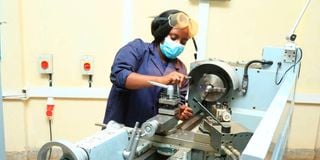How technical institutions can be green hubs

A mechanical engineering student operates a lathe machine at Nyeri National Polytechnic in June 2021.
The effects of climate change are real. The quest for its mitigation and adaptation has attracted regional and global attention.
If the Africa Climate Change Summit hosted in Kenya is anything to go by, then this is evidence that nations are out to burn the midnight oil to see to it that the devastation by changing global weather patterns is reversed.
However, the success of such efforts in individual countries will largely depend on the strategies adopted. The spirited efforts by nations can help them realise noble objectives in attaining sustainability in food production; water and energy sufficiency while maintaining environmental sustainability.
For Kenya, there is an opportunity to align the education system with elements of environmental literacy at both formative and tertiary levels.
Education plays a crucial role in shaping cultures, beliefs and behavioural patterns hence entrenching environmental consciousness amongst the learning population segment is a sure bet in building capacity to combat the vagaries of climate change and bringing about a green revolution.
While this should run across all education institutions, the centre of focus should be the technical institutions because they are established to offer practical skills that are relevant to the industry.
The strategic positioning and presence of technical institutions across the entire nation can offer a ground for growing ideas, skills and innovations that are tailored towards igniting an environmentally sustainable skills revolution.
Across all the disciplines, there are elements of environmental consciousness that can be developed at the skills level to ensure that we are getting solutions towards building our industries that utilise resources sustainably.
Some of the resources like water and energy can be developed and managed based on sustainable sources and concepts respectively.
Green technologies like solar, wind, hydrogen, biomass, hydro, water purification, water source development, and waste management (reduction, reuse, recycling), inter alia, can be domesticated at skills development levels both in building and managing the same.
The competency-based education and training approach to technical education anticipates a vibrant collaboration between the technical institutions and the industry to help bridge the gap between industry needs and imparted skills. That means cooperation between industry players and technical institutions in developing green solutions.
Charles Butiko, Eldoret




